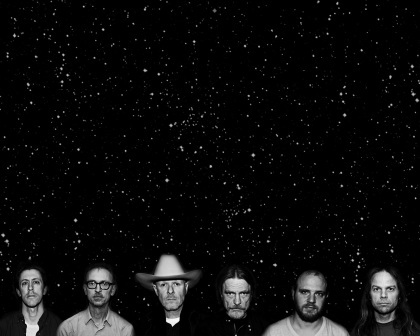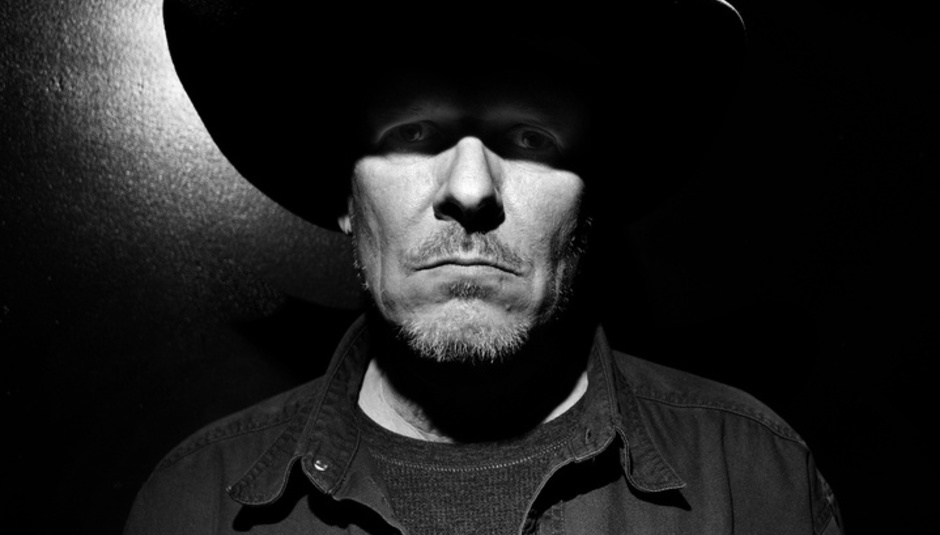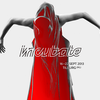Deny it as he may, Swans’ Michael Gira is a scary looking guy. As we talk for half an hour or so on Skype, this is the profile picture, blown up to full screen, that I’m looking at. Confessing to jetlag and understandably weary of press commitments, Gira is a surprisingly humble, thoughtful and considerate guy but nonetheless the most terrifying interviewee I’ve had the pleasure of coming across.
Thirty years into a career making notoriously scary music, Swans produced the deeply unsettling but oddly beautiful The Seer. Not only was it among the very best albums released in 2012, but many consider it to be the highlight of a remarkably consistent discography. I sat down with a notebook filled cover to cover with scribbled questions about the band’s history, but as soon as THAT image appears most are discarded as nonsense: it doesn’t take much intuition to realise that however mellowed Gira might be, he won’t appreciate a blabbering idiot (of course when one idiotic question did flop haplessly out of my mouth, this was pretty instantly confirmed).
Things only got worse for me on the occasions that Michael’s young daughter entered the room and he was drawn away from our conversation. When you realise that the man who gave you nightmares with Children of God is actually a kind, warm-hearted, wryly humorous, loving Dad... well then you start to feel a bit of an asshole for quaking at your desk.
You’ve been described as the world’s loudest, nastiest band, yet this perception of Swans as simply a loud hardcore post-punk band seems unfair to me as I’ve always thought the volume of your work shares equal prominence with a lot of delicate melodies and textures. Would you agree that Swans are miscast in the public’s and media’s perceptions?
“I don’t know if it’s the public to be honest. It’s as if the public have been sold by the idiotic obsession of the media as you mentioned. I think that’s just a stupid thing to say it’s hardcore, I guess it’s easy. When your sisters and brethren in the music press are looking for an easy tagline they might choose something like that.
“We do use volume, but unless it’s at a certain level it just doesn’t sound right if the guitars don’t ring and you don’t feel it in your body. It’s something that we do, but we don’t intend as any sort of act of aggression or anything like that. I wanted to find a creative environment in which you can lose yourself, which I might say is no stranger to previous rock bands such as maybe The Stooges or Pink Floyd. It’s meant to be all encompassing and the way we achieve it is by getting pretty fucking loud!”
That’s interesting because [drummer] Thor Harris recently said that there is a lot of negative energy and rage in the music at a Swans show but it’s also euphoric; it helps him to recover from mood swings brought about by depression and hopes it has a similar effect on the crowd. Do you feel this way as well?
“Well, you know, Thor’s a, er, a morose individual! Actually no he’s the sweetest dude ever, but I don’t look upon it as negative at all. Not in the slightest. I look at music, and the enterprise of making records, and being fortunate enough to write songs and play live as an enormous privilege.”
 [420x336]
[420x336]
You’re going to be playing at Primavera Sound 2013 in Barcelona at the end of May along with My Bloody Valentine; I guess people need to bring their earplugs...
“Well people talking about the idea of a ‘loud-off’, oh my God that’s so stupid I can’t believe it. I mean, not to criticise them in any way, I think our music couldn’t be more different. From what I know of their music they’re a kind of monolith of sound, right? There’s not too much in the way of dynamics? Whereas with ours there’s a tonne of dynamics and we’re creating a whole kind of world in the mind. It’s not about creating a wall of sound; I mean sometimes it’s quite uplifting but there’s always an way in which I’m kind of building a cyclone that we can all rise up to heaven in. But The Seer couldn’t be more different [to MBV].”
Moving on then.
Do you consciously look to make each record more extreme and push the boundaries further than on the last? I’m thinking of the progress between My Father Will Guide Me Up A Rope To The Sky and The Seer as an example.
“Usually I discover the ‘new thread’ within the previous album. The Seer for instance contains some sections which really delve into just grooves so we started to push that aspect forward a little more. There’s a lot of songs I wrote in those sessions that could be on the next album, but that’s the thread: I found that and decided ‘well I’m just gonna pursue this now’ and that’s how it always works. There’s always something in the current work that leads to the next one. I don’t really think critically or about the wider picture, I just think about how I keep working without boring myself and my audience.”
At this point Michael’s daughter comes into talk to him. “You see what a horrible misanthrope I am now?”
That whole image of you is just gone now!
“It was never there really.”
You mentioned that you had some songs that could work for the next album. Do you already have ideas for the sound of the album yet?
“Pretty much our entire live set – I’d say about 80% of it right now – is unrecorded material that we’ve developed over the past six months of touring. We’re moving forward, always and... I’m so sorry I completely forgot where we were before. We just got back a few days ago and I still haven’t slept.”
Do you find that touring such an intense, physically demanding show is taking its toll more these days?
“Yes. [Laughs] Indeed. No it’s also rejuvenating, so I’m almost fearful of what would happen if and when I stop. I might just... you know how Dracula suddenly becomes drenched in light and turns into charcoal? I’m kinda scared that might happen if I stop moving!”
It’s been well documented that you had a somewhat difficult early life and your songs have often dealt with despair and anger, yet in a recent interview you said that your music isn’t necessarily conditioned by your environment. Are your songs therefore genuinely detached and impersonal?
“No they’re still based on personal experience. Sometimes I write from things I’ve read, or recently I wrote a song after seeing a really beautiful movie. It doesn’t describe the movie but rather it’s inspired by the sensations it provided. The songs start from a memory and then build into something, but it’s not like I’m singing about my problems. To sing about myself, I think that’s very onanistic and not very interesting.”
If not then is there anything you wrote about earlier in your career that you feel differently about now?
“Well I feel differently about almost 100% of everything. ‘Early in my career’ means over 30 years ago now, so if I hadn’t changed I think I’d be... um, dead.”
Your work also has a kind of psychedelic element and I guess you were something of a child of the 60s. How important was the counter culture of the time to you?
“As important as it was for any person growing up then. It was like a cultural tidal wave that you couldn’t escape whether you were on one side or the other. People nowadays consume – for want of a better word – culture in a ‘pick & choose’ way whereas then it was this eruption of – I don’t want to say ‘rebellion’ – but it was an eruption of fire and anger and dissatisfaction and love and creativity... all good things! There was a mass of cultural changes going on and the music was an integral part of that; it wasn’t above it or outside of it, it was part of those massive cultural changes.”
A huge part of that cultural shift was the 1968 Studentenbewegung [student movement] in Germany. Did you feel any connection to that and the subsequent Krautrock movement, and was it an influence on [German language EP] Die Tür ist Zu?
“I have a connection to Germany, in that my father’s second wife was German, and he had three children with her, and I lived in Germany when I was young. When I go back it’s a pretty nostalgic thing in a way and I feel a kinship with Germany, so I did that album sort of as a gift.
“The thing is it was received with a measure of, er, comedy. The German was so bad, and I think my accent was just so terrible that people laughed!”
How important are lyrics to you? You once described Willie Nelson as “a true American poet” but for me your lyrics have often seemed to be there to dovetail with the sounds to create imagery and texture.
“Well it depends on the piece or the song. I was preoccupied for a number of years with this project Angels of Light [Michael’s band during Swans’ hiatus], in which the words were very important, because that was my attempt at writing narrative songs.
“But with Swans there are sort of two different trajectories. The main trajectory is the songs I write on an acoustic guitar and then orchestrate in the studio; I mean orchestrate like European art songs, you know? I’ll try and create a sort of philharmonic environment around the lyric.
“And then there’s other songs, ‘pieces’, maybe you’d call them? The songs on The Seer were like this, where too many words intrudes on the ‘sonic event’. So then the trick is to find phrases that qualify the sound without it being about the singer. You can look at it like gospel music in a way, where you have a phrase you just keep repeating and it keeps growing, like a mantra or a prayer in a way. It’s always a challenge to come up with just the right words for these bigger pieces that we do. Everything you say makes the sound seem smaller, but then I don’t just want to throw words out of the phone book at it either. The words are very important but there are very distinct ways of using them in the music that we make.”
You mentioned writing songs on your acoustic guitar, and for a post rock band with a reputation for loudness there is a lot of acoustic guitar, particularly on your later records. Does the process of creating the songs involve you writing them at home on an acoustic guitar and then conveying your vision for them to the rest of the band?
“That’s exactly what happens. However the difference between the two different trajectories, or ways of working, is that when I write the songs on the acoustic guitar, then I bring them to the band and we start performing them live, but in a really kind of unfinished way. I allow the band and myself to then build them into something that becomes a, er, Swans song, a band song. I provide the impetus for it and I guide it along the way, but it grows through us playing it live as a band, and everybody has input so it grows organically and from night-to-night it changes.
“So that’s one way, and then another way is that I’ll have a finished song on acoustic guitar and I’ll go into the recording with, say, the drummer keeping time and play the basic song with a scratch vocal. And then I’ll just start building it up. I’ll have a plan – although it’s normally abandoned halfway through – for orchestrating it into almost a little piece of cinema.”
Has your writing process changed as your music has evolved and the songs become more complex through your career?
“I’ve never allowed myself to give up as much... I don’t want to use the word ‘control’, but to give out to the moment as much as I have with this current band. But once I started playing with these fellows either my initial ideas seemed ludicrous & lame, or they sounded good but needed to be augmented further. You know these are really good musicians with great intuition so they’ll start adding ideas, and I’ll find out whether I like them or not, and we’ll gradually – from show-to-show, from soundcheck-to-soundcheck – things will morph into these pieces.”
Michael’s daughter has been drawing on the walls. After a few moments, we resume.
You talked about conveying ideas to the rest of the band and letting them expand on these. Are there ever any difficulties in getting those initial ideas across?
“Yes. Oftentimes it’s like the Sex Pistols lyric: I don’t know what I want, but I know how to get it. It’s like there’s this amorphous colour in my mind and trying it find it is really difficult. It’s almost impossible to convey, so with the band it’s a case of trial and error in trying to find a way. That’s how it works.”
Speaking of the band, the line-up has very much been a changing one over the past thirty years. Is there anyone you particularly miss working with or would like to work with again?
“No I don’t miss anyone.” [Pauses for what seems like a year, then thankfully chuckles] “I mean, Jarboe was my mate, and she contributed quite a bit. But that’s over, and I’d love to have her involved in the music again in some fashion, but certainly not as a touring thing. It was nice to have her input on the last record though.”
Yeah, that seemed like a bit of a funny one, because you reformed the band in 2010 without her and then she appeared again on The Seer, but then you don’t tend to really play anything from her time with the band in your live sets. I was wondering what the reasoning behind all that was?
“It’s just a time gone by. I didn’t want to go back that route. If there’s ever a piece or a song that would benefit from her voice I definitely will ask her to be involved, but if nothing occurs...”
Even as your music has evolved and progressed matured your audience seems to remain young – The Seer was one of DiS’s albums of 2012 and I imagine our readership to consist mostly of the 20-something crowd. Are you particularly aware of Swans remaining popular amongst and relevant – almost cool – to young people?
“I don’t know about cool, I hope we’re never cool. But it is nice to see young people in the audience. And that’s almost necessary, because if it was just a bunch of paunchy 40- or 50-year old men in black t-shirts I would definitely blow my brains out [Laughs]. But it’s nice to see young people, and I think that means that our music has some kind of vitality.”
Do you find there’s much of a difference between your live shows now to those earlier in your career?
“Yeah. The shows now are ‘full’, I guess – complete experiences. They’re really ecstatic in places, for us and I hope the audience. I think it’s working in that way; like I said it’s not meant to pummel anybody, it’s really trying to reach this weird joy that’s inherent in the music. When it works it’s what I feel like I was put on earth to do.”
What was the driving force behind reforming in 2010? I thought you went out on such a high with Soundtracks for the Blind – it is, I think, my favourite of your albums – and it was so highly regarded...
“I’d reached, I think, an end point with this Angels of Light thing, with that record label, and wanted to be inside this kind of sound again. I didn’t want to be like these bands who reunite and just play their old records.”
With a lot of bands reforming around that time it seemed like they were doing it for the cash cow, but it never really felt that way with Swans.
“I actually don’t mind the cash. But the only motive I can give, I guess, is that I needed to challenge myself. As an artist I just feel like a piece of lard, so if I’m not in a comfortable place, or trying to make something bigger than myself then it’s like I’m wasting my time. So that’s why I did it.”
Having already once dealt with drawings on the wall, Michael again has to attend to his daughter. “I need an eraser” I hear her say.
“I’m so sorry” he laughs. It’s probably time to stick a fork in this one and call it done.






















